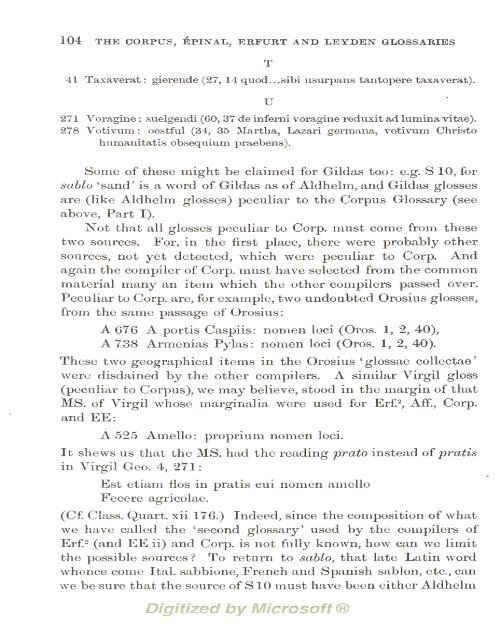the corpus, épinal, erfurt and leyden glossaries, viii - World eBook ...
the corpus, épinal, erfurt and leyden glossaries, viii - World eBook ...
the corpus, épinal, erfurt and leyden glossaries, viii - World eBook ...
Create successful ePaper yourself
Turn your PDF publications into a flip-book with our unique Google optimized e-Paper software.
104 THE CORPUS, EPINAL, ERFURT AND LEYDEN GLOSSARIES<br />
T<br />
41 Taxaverat : gierende (27, 14 quod...sibi usurpans tantopere taxaverat).<br />
U<br />
27 1 Voragine : suelgendi (60, 37 de inferni voragine reduxit ad lumina vitae).<br />
278 Votivum : oestful (34, 35 Martha, Lazari germana, votivum Christo<br />
humanitatis obsequium praebens).<br />
Some of <strong>the</strong>se might be claimed for Gildas too: e.g. S 10, for<br />
sablo 's<strong>and</strong>' is a word of Gildas as of Aldhelm, <strong>and</strong> Gildas glosses<br />
are (like Aldhelm glosses) peculiar to <strong>the</strong> Corpus Glossary (see<br />
above, Part I).<br />
Not that all glosses peculiar to Corp. must come from <strong>the</strong>se<br />
two sources. For, in <strong>the</strong> first place, <strong>the</strong>re were probably o<strong>the</strong>r<br />
sources, not yet detected, which were peculiar to Corp. And<br />
must have selected from <strong>the</strong> common<br />
again <strong>the</strong> compiler of Corp.<br />
material many an item which <strong>the</strong> o<strong>the</strong>r compilers passed over.<br />
Peculiar to Corp. are, for example, two undoubted Orosius glosses,<br />
from <strong>the</strong> same passage of Orosius:<br />
A 676 A portis Caspiis: nomen loci (Oros. 1, 2, 40),<br />
A 738 Armenias Pylas: nomen loci (Oros. 1, 2, 40).<br />
These two geographical items in <strong>the</strong> Orosius 'glossae collectae*<br />
were disdained by <strong>the</strong> o<strong>the</strong>r compilers. A similar Virgil gloss<br />
(peculiar to Corpus), we may believe, stood in <strong>the</strong> margin of that<br />
MS. of Virgil whose marginalia were used for Erf^ Aff., Corp.<br />
<strong>and</strong> EE:<br />
A 525 Amello :<br />
proprium<br />
nomen loci.<br />
It shews us that <strong>the</strong> MS. had <strong>the</strong> reading prato instead of pratis<br />
in Virgil Geo. 4, 271 :<br />
Est etiam flos in pratis cui nomen amello<br />
Fecere agricolae.<br />
(Cf Class. Quart, xii 176.) Indeed, since <strong>the</strong> composition of what<br />
we have called <strong>the</strong> 'second glossary' used by <strong>the</strong> compilers of<br />
Erf ^<br />
(<strong>and</strong> EE ii) <strong>and</strong> is Corp. not fully known, how can we limit<br />
<strong>the</strong><br />
possible sources ? To return to sablo, that late Latin word<br />
whence come Ital. sabbione, French <strong>and</strong> Spanish sablon, etc., can<br />
we be sure that <strong>the</strong> source of S 10 must have been ei<strong>the</strong>r Aldhelm

















